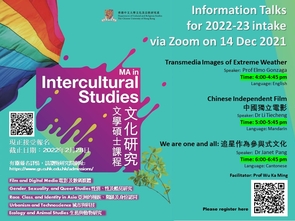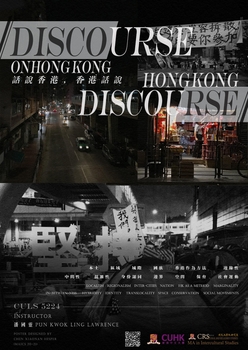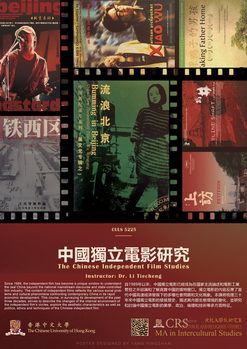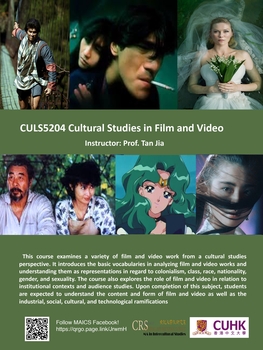

 |
 |
 |
 |
香港中文大学的文化研究硕士课程在电影和数字媒体、性别和性、城市主义、技术科学、后人类主义、生态和动物权利等领域的研究处於前沿。
我们的学生学习如何运用文学与文化研究、批判理论、性别与酷儿研究、文化人类学、科学与技术研究、城市与环境人文学等不同的视角和跨学科的方法,来研究社会结构和过程与文化表徵、身份之间复杂、动态和偶然的相互作用。
我们的学生将具备批判意识、文化敏感性和分析能力,以应对差异和冲突加剧的全球化世界中的困难和挑战。
【到底文化研究系咩嘢嚟?】-文化研究快问快答
【到底文化研究系咩嘢嚟?】-中大文化研究关键词
Game Studies
Research keywords for Cultural Studies: Waste Studies
Research keywords for Cultural Studies:
Southeast Asian Media and Culture
Research keywords for Cultural Studies:
Independent film
CHEN Xiaonan
There is no absolute answer in the world of cultural studies. It tells me that everything in front of us is constructed and shaped by human society, and that the problem lies not in blind deconstruction, but in how we look at it. This program provides a variety of possibilities to see the world, and insights into the insufficiencies of the world. For example, the MA research paper made me see the power of the edge and another possibility of life. Urbanscape/Space Studies made me realize the relationship between urban order and modernity while paying attention to the street life eroded by homogeneous consumption of space. Animal and Society Studies told me to put aside the prejudices of "non-us tribes", and to try to look at different creatures from a perspective that transcends species, which echoes the spirit of Taoism.
显示更多HUANG Zhicheng
The eight-month course ended quietly. I am very grateful to all my teachers’ careful instruction and classmates’ warm help. Although we are still in the middle of the pandemic, and most courses are delivered online, the quality has not been affected at all. On the contrary, I feel the relationship between students and teachers has become even closer. We’ve benefitted a lot from our teachers' passionate and innovative teaching. We can also share and give feedback directly in Zoom and explore all kinds of interesting social and cultural phenomena with our teachers in the class. The curriculums are deeply concerned with marginalized people and minorities. They teach us to critically view socio-cultural issues from multiple perspectives, and understand the underlying ideology and power relations behind the social mainstream. The one-year period is packed and enjoyable. What I learned from this specialized program is more than just direct skills or techniques but more a way of thinking and analysis.
显示更多YANG Zhengfang
The learning process in this program was like wearing a new pair of glasses for me. Before putting on these glasses, I couldn’t see any problems in our lives because our generation is inevitably affected by mainstream discourse and ideology in education and media. After wearing these glasses, I began to rethink our society and culture from a critical view. For example, the Chinese independent film course of TC Li allowed me to watch many films about marginalized people, and also made me realize the significance of video records, which directly affected my career planning. Also, Janet encouraged us to challenge the heterosexual hegemony in life and challenge ourselves to communicate with people who hold different opinions in her gender course. Although the one-year study is over, the impact of ICS on me has not ended. I hope that I can continue to put the perspectives of cultural studies into practice in every conversation and every action in my daily life.
显示更多SUN Ruigang
The past year was an important year for me. Aside from learning many theories, I did not know before, the main difference for me is that my perspective of seeing the world has changed. Minority groups, social inequity have now been my focus. Feminism, the identity of minorities, the elderly people left behind, the overlooked incidents by mainstream media, are all the topics we used to overlook and misunderstand. But MAICS gives us the power to see them. This is not only humanity thought, but also a way to reduce social inequity, promote rights for every single person. My study interest is in the field of posthuman/posthumanism. One reason is my interest in sci-fi artworks, while the other reason is the idea MAICS has brought to me. Humans are now entering a future society, which in no doubt will bring inequity. The thoughts on how to reduce the inequity are what MAICS brought to me in the past year.
显示更多LIAO Bingyu
My way of thinking changed. Last year, as a communication school student, I may have asked: "how do you tell good stories about China?". However, now I might ask: "why shall we tell good stories about China? How are ideas of the nation and individuals represented in a good Chinese story?". Furthermore, I may also ask: what is enforced and what is marginalized in a good Chinese story? When adding elements of nation, gender, race, class, cultural identity, globalization, and localization into the same issue, I find that I am unsure about the world. Yet, at the same time, I become more kind and more tolerant. The past two semesters are just enough for me to take eight courses, become familiar with the trails on campus, and to get to know a group of like-minded friends. We discussed shamanism, illness as a metaphor, and digital refugees. We talked about boy love dramas, the newest games, and discourses of war. We critique while enjoying popular culture, and we complain while trying to convert stereotypes. Friends of ICS, I am looking forward to meeting you again after graduation!
显示更多MAO Hanlin
In the initial stage of application, my interest was mainly in the studies of identity and gender. Janet inspired us to reflect on issues like feminism, sexual minorities, queer movements and their underlying power relationships, through image text analysis, guest lectures and well-designed teaching contents. Hence, I could adopt a new vision and perspective in cross-cultural studies. Under her instruction, I also learned to be humble, which is vital for students majoring in cultural studies. In other words, I know the importance to learn and understand everything with modesty, hold everything in awe and veneration, and be empathetic for all people and all things. I am thankful for what I have obtained in the project! I hope that the epidemic will end soon so I can see you again at CU!
显示更多LI Hui
It has been a fruitful year for me in MAICS. This program embraces diversity and inclusiveness where I do not need to identify myself as anything other than a human being, and teaches me to care about all things human and non-human. Furthermore, it equips me with critical thinking and the strength to confront social issues. The process of thinking has always been distressing for me and I found myself weak when facing all kinds of problems about gender, race, and class, etc. It is MAICS that clears up the fog of confusion and sense of powerlessness, which offers me multiple lenses to deconstruct and edge in these affairs, rendering me critical and insightful. I am not afraid of confronting these intractable topics anymore and I try to apply what I have learned to handle these issues. The global pandemic made this year unique for everyone. Teaching faculties strove for the visual classroom while students tried to adapt to this new mode of learning. But this also sparked more thoughts of ICS students on digital society, globalization, and so on. Yes! We never stop thinking and this is MAICS!
显示更多SIN Po Sze
I still feel all of the teacher’s enthusiasm and seriousness in teaching even though we are still going to be spent this year under the epidemic. MAICS has not only improved my theoretical knowledge, but also strengthened my ability to think critically, allowing me to re-examine the way of understanding the world, reflecting on universal values and phenomena, and the relationship of how they are constructed between myself and society as a whole. Moreover, my curiosity and imagination toward the future has increased. I believe that improving one’s thinking ability is precious and far-reaching, so this learning experience is only one part of a lifetime. What I have learned today not only consolidated my foundation, but can also be applied to different upcoming challenges, guiding me to go further during my life journey.
显示更多